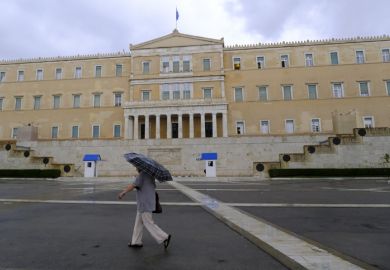A French university has announced plans to open a private branch campus in Greece, following the introduction earlier this year of new legislation enabling international universities to open fee-charging Greek branches.
Sorbonne Paris North University, a public institution formed after the dissolution of the University of Paris, will partner with the private college Institution d’Etudes Francophones (IdEF), located in Athens, to transform the latter into a private, non-profit university under the name French University of Greece – International Campus Université Sorbonne Paris Nord.
The branch campus continues an existing collaboration between the two institutions, established in 1995, through which students at the Greek college can pursue international undergraduate and postgraduate degrees. “Currently, degrees are issued directly by Université Sorbonne Paris Nord in Paris, and our intention is to maintain this status,” the IdEF director Stylianos Amargianakis told Times Higher Education.
“For us at [IdEF], not much will change except for the legal framework governing our operations in Greece. Our students are already students of the university in Paris, adhering to the same exceptionally rigorous quality standards in their studies,” Professor Amargianakis continued.
“There will be necessary adjustments to comply with any legal requirements set by the Greek authorities, ensuring that the university’s presence in Greece aligns with the local legislative framework.”
At first, the French University of Greece will provide undergraduate and postgraduate studies in three faculties – law, economics and physical education – with plans to introduce extra subject areas, among them media and communication, after several years of operation.
“We aim to achieve the highest quality level of university education in Greece from the outset; hence, our goal is quality, not quantity,” Professor Amargianakis said. “At the core of these university faculties, from the very beginning, will be cutting-edge research and the utilisation of pioneering technologies, such as artificial intelligence.”
Funding to set up the branch campus, the college director said, has “already been secured” through “contributions from members of the private academic community in Greece”. In future, he added, the institution “will also utilise donations, research outcomes, services to the industry, community resources [and] student contributions”.
“Our ambition is to gradually adopt a management model that covers operating expenses exclusively through donations and the utilisation of research outcomes and development programmes,” he said. “To this end, our operational plan includes an initial investment of €10 million [£8.4 million], with the aspiration to offer the most extensive private scholarship programme ever launched in the country.”
The Greek government has set a target date of September 2025 for the opening of the first private branch campuses – a “quite ambitious” timeline, Professor Amargianakis said, considering “the full set of legislative provisions and regulatory decisions has not yet been completed.
“In any case, whether in September 2025 or a few months later, the French University will be among the first, if not the very first, to be established.”
Register to continue
Why register?
- Registration is free and only takes a moment
- Once registered, you can read 3 articles a month
- Sign up for our newsletter
Subscribe
Or subscribe for unlimited access to:
- Unlimited access to news, views, insights & reviews
- Digital editions
- Digital access to THE’s university and college rankings analysis
Already registered or a current subscriber?




